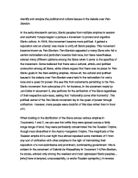When looking at the distribution of the Slavs across various empires in Documents 1 and 2, we can see that while they were spread across a fairly range range of land, they were particularly concentrated the the Russian Empire, though most diversified in the Austro-Hungarian Empire. The magnitude of the Russian empire in its own right thus almost repulsed some members of it from any sort of unification with other empires in the right of maintaining their reputation of a non-submissive and prominent, domineering government- this is evident in the statement of Gabriel de Wesselitsky in Document 14(Pan-Slavism, he states, existed only among the weakest and most oppressed Slavic peoples… [who] have attempted, unsuccessfully, to excite Russian sympathy.) A reverse logic, however, was also present- that in the unification of races that would present a Slavic Empire, the Russians, already known leaders of a large empire, might attempt to establish themselves as rulers. “What a delightful invitation”, quips Frantisek Palacky- a Czech- in Document 11, “for the Russians to create a universal monarchy!” Austria’s foreign minister at the time also references this fear in Document 12, stating that “our slavic nationalities are likely at a moment of dangerous crisis to develop pro-Russian tendencies.” The Austro-Hungarian Empire, however, while resistant to the idea of the influence of the Russian empire, attempted to incorporate their avoidance of it into their treatment of the Pan-Slavic movement- this is evidenced in document 5. “Austria must… promote its national development… and thus destroy all illusion of a Russian Pan-Slavism ...among others and its own peoples, who would no longer regard Austria as an alien ruler.”
Some were even hesitant at the Pan-Slavic initiative due to what they viewed as an unrealistic ideal- a Russian anarchist, in document 6, [to paraphrase] states that while the Pan-Slavic goal aims for unity, the Russian Empire’s true and dominant nature manifests itself in opposition of this goal. “You demand independence, and in Russia there is only mechanical obedience,” states Bakunin. Sienkiewicz(document 4), a Polish author, also expresses a similar fear of the Pan-Slavic ideal, expressing concern that throwing Poland into Pan-Slavism would be unwise as “a Slavic idea, which in reality does not exist, would lead Poland astray.” Sienkiewicz seems to be of this mindset because she believes that the differences between various Slavic parts would be far too much to put to any amount of rest in a feasible period of time. Many people were of a similar mindset, believing that such unification on a large scale could prove to be destructive and not productive.
Yet others believed that the the resultant large melting pot caused by the Pan-Slavic movement might destroy the distinctive makings and markings of each culture in it. For this reason, many people were opposed to the Pan-Slavic movement. A Czech journalist, in document 7, expresses his/her conviction that “the Slavs… are not one nation. The name Slav is and should forever remain a purely geographical name. Nationality is not only determined by language but also by customs, religion, form of government…”. This is similar to the statement made in document 4 in that both share an opinion of not wanting to compromise existing characteristics for melted and likely failed new ones. Document 9’s Bulgarian poet says it well: “The idea of Slavic unity… has developed little because it ignores our distinct identities.”
A final group of people wished to join the Pan-Slavic movement and build a Pan-Slavic Empire - but only following the destruction of already existing and large empires among Slavic nations. Trentowski, a Polish philosopher, states in Document 8 that “[he] would destroy, without effort, the Ottoman and the Austrian empires. The Slavs would rush into this battle in great number.” However, the acknowledgement that if the Pan-Slavic movement were to be followed through with, then great conflict would result still existed among this group of people.
It can be said in conclusion that the presence of already existing empires and domineering governments presented the greatest challenge to the Pan-Slavic movement. In the end, though there was no “Pan-Slavic Empire”, many unions between Slavic countries did forms, as did Slavic languages. This was perhaps for the best, as these partial unions were perhaps more productive than the formation of a full-blown Pan-Slavic empire would have been.







